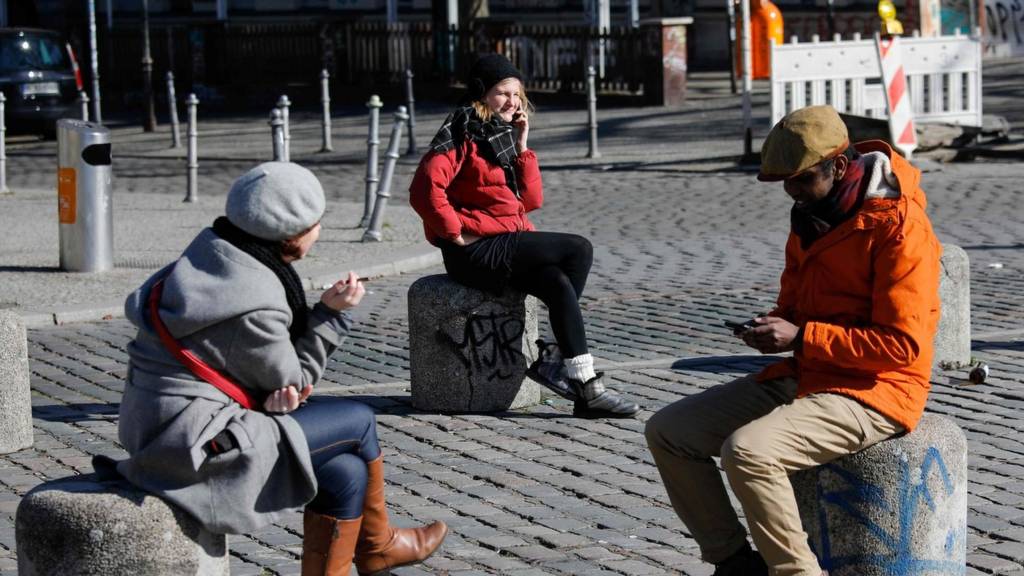
Germany bans groups of more than two to curb virus
Tighter curbs on Italians in Lombardy; Australia's biggest cities to shut down; India's busiest rail network shuts; The rough sleepers who can't isolate; How people are surviving self-isolation; What are the symptoms?
Related Video and Audio
RTL
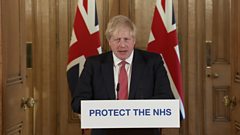

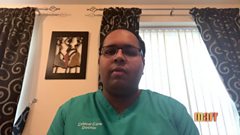
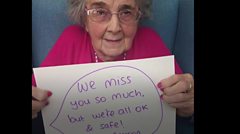

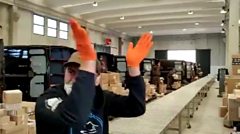
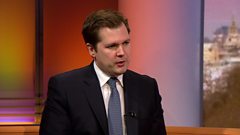

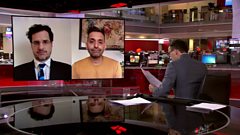

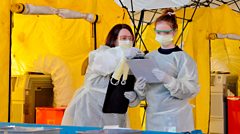

Live Reporting
Joshua Cheetham, George Bowden, Paul Seddon, Victoria Lindrea, Holly Honderich, Gareth Evans, Hugo Bachega and Sean Fanning
All times stated are UK
-
The number of people who have tested positive for coronavirus worldwide passed 300,000, with more than 13,000 deaths. At least 93,000 people have recovered
-
Spain registered its worst figures yet after almost 400 people died in a single day. It brought the national total there to 1,720
-
It's a similar picture elsewhere. Iran, which is one of the worst-affected countries, reported a spike in both cases and deaths. As did Germany, Greece, France, Italy and a host of Asian countries
-
German Chancellor Angela Merkel said she was self-quarantining after coming into contact with a doctor who has the virus. Her government also banned gatherings of more than two people
-
Italy announced another 651 deaths in 24 hours, but the figure is less than the previous daily total
- Australia announced a nationwide shutdown of non-essential services. Pubs, clubs, gyms, cinemas and places of worship will all close
- More than a billion people in India were asked to observe a 14-hour long curfew to try to combat the pandemic
-
And in the UK, Prime Minister Boris Johnson said special steps must be taken to protect 1.5m vulnerable people. The number of cases in the country reached 5,683, with 281 deaths

geCopyright: ge 
BBCCopyright: BBC 
Getty ImagesCopyright: Getty Images 
AFPCopyright: AFP 
AFPCopyright: AFP 
Getty ImagesCopyright: Getty Images 
Getty ImagesCopyright: Getty Images -
PM Boris Johnson warned the government would take "further measures" to enforce social distancing advice if it is not respected
-
He said he would think "very actively" about this over the next 24 hours
-
He said he wanted people to continue to be able to go to parks, but people should stay 2m (6f) away from others
-
Communities Secretary Robert Jenrick pledged the government would support 1.5m vulnerable people advised to stay at home for 12 weeks
-
He said he hoped food deliveries to them would begin at the end of next week, and would become more "sophisticated" over time
-
He added that councils would join up with supermarkets to ensure food deliveries are made


ReutersCopyright: Reuters Angela Merkel announced the new measures on TV on SundayImage caption: Angela Merkel announced the new measures on TV on Sunday 
BBCCopyright: BBC 
BBCCopyright: BBC 
BBCCopyright: BBC
Latest PostWe are pausing our live coverage
It's been another day of major developments in the global fight to contain the coronavirus outbreak.
We're pausing our live coverage for now, but we'll continue to bring you updates across the BBC News website.
Here's the latest:
McDonalds restaurants to close across UK and Ireland
All McDonalds restaurants across the UK and Ireland will close by 19:00 GMT on Monday 23 March.
The fast food giant said the decision was "not taken lightly" and was made "with the well-being and safety of our employees in mind, as well as in the best interests of our customers".
In a post on Twitter, they thanked their "brilliant employees for their hard work" and said the restaurants would re-open "as soon as it is safe".
A visual guide to the pandemic
Coronavirus is now affecting more than 160 countries and has claimed more than 13,700 lives.
According to the World Health Organisation (WHO) it took more than three months to reach the first 100,000 confirmed cases worldwide, but only 12 days to reach the next 100,000.
Our Visual and Data Journalism team has created a series of maps and charts to help you understand what is going on.
EU to stockpile masks and ventilators for member states
The EU has decided to create a stockpile of medical equipment such as masks and ventilators to help those member countries who are struggling to secure supplies in the battle against coronavirus.
The European Commission said it would finance 90% of the stockpile, which will distributed to countries that need most.
The announcement comes amid criticism that the EU is not doing enough to support the many states dealing with a rising death toll from Covid-19.
In addition, the EU continues to help members bring back their citizens who are stranded abroad because of the outbreak. Up to 75% of the cost of repatriation is covered by the EU, providing the flight repatriates citizens of more than one member state.
What are social distancing and self-isolation?
They're terms we weren't using even just 10 days ago. But now social distancing and self-isolation form part of the response to the coronavirus - and they apply to everyone to different degrees.
Social distancing is important because coronavirus spreads when an infected person coughs small droplets - packed with the virus - into the air.
These can be breathed in, or cause an infection if you touch a surface they have landed on, then your eyes, nose or mouth.
Self-isolating means staying at home and not leaving it, other than for exercise. Don't go to work, school or public areas during this time.
Read more here.
Why has Italy been so badly affected?
You’ve probably heard by now that Italy has been hit hard by the virus.
It’s now at the epicentre of the outbreak, and the country's president has urged other countries to learn from its struggle to slow the spread of Covid-19.
The number of recorded deaths there recently overtook those in China, where the virus originated last year. Italy reported 651 coronavirus deaths on Sunday and saw its toll for the past month reach 5,476, the highest in the world.
So why has Italy been so badly affected? A number of possible reasons have been mooted.
Some studies point to the large number of elderly people in the worst affected regions, such as Lombardy in the north. Italy also has the oldest population in the world after Japan with some 23% of people there over the age of 65.
This matters because the virus is especially dangerous for older people.
The vast majority of Italy's fatal cases involved elderly people with at least one pre-existing condition, officials say. The average age of the first 3,200 people who died was 78.5.
Experts also say a large proportion of 18-34s live at home with these older people, which increases the risk of the virus spreading.
Another factor that may help explain Italy's crisis is the length of time the virus has been active.
Some health officials believe it arrived in Italy long before the first case was officially confirmed in late February. It likely spread undetected through northern Italy, possibly for several weeks.
French death toll rises by 112 to 674
The death toll from coronavirus in France has increased to 674, after another 112 people were confirmed to have died over the past 24 hours.
"The virus kills and it is continuing to kill," said health official Jerome Salomon on Sunday.
A total of 16,018 cases have been recorded in France, but the figure is widely believed to be an "underestimate", Mr Salomon warned.
France has been in lockdown since Tuesday, with only essential trips outside permitted. Mr Salomon urged the people to show "patience".
Placido Domingo tests positive for coronavirus
Opera singer Placido Domingo has tested positive for coronavirus.
The 79-year-old Spanish tenor wrote on his Facebook page that he was in self-isolation with his family, but remained "in good health".
"I experienced fever and cough symptoms therefore deciding to get tested and the result came back positive,"
He urged his followers to wash their hands frequently and keep their distance from one another.
"Together we can fight this virus and stop the current worldwide crisis," he continued.
The opera star recently resigned as general manager of the Los Angeles Opera following allegations of sexual harassment. He has since publicly apologised to his accusers.
Spain is struggling to contain Europe's second worst outbreak of the coronavirus after Italy, with over 28,000 cases
Breaking18-year-old with underlying conditions dies in England
The latest figures for coronavirus-related deaths in England included a person as young as 18, the NHS says.
In total 37 people with the virus died today in England, all in vulnerable groups including with underlying conditions.
There were another seven in Wales, three in Scotland and one in Northern Ireland.
'It’s insensitive. It’s arrogant': NY governor berates residents
New York Governor Andrew Cuomo chastised New York City residents for defying official health guidance and continuing to socialise in large groups.
"It’s a mistake. It’s insensitive. It’s arrogant. It’s self-destructive," Mr Cuomo said on Sunday.
"This is not a joke, and I am not kidding," adding that he shared New Yorkers’ frustration at having to stay inside. "I’m even getting annoyed with the dog."
Mr Cuomo has cancelled all non-critical surgeries in the state as cases across New York continue to soar. There are at least 15,168 confirmed cases - a jump of 4,812 since Saturday - and 114 deaths, Mr Cuomo said.
At least 38 of New York City’s over 9,000 cases are those inside prisons, including 21 inmates. Activists have urged early releases to lower population densities within the facilities.
Already, prisons in Los Angeles and Ohio have allowed for hundreds of early releases and New York’s mayor has said the city will look to release “vulnerable” inmates.
First US senator tests positive
US Senator Rand Paul has tested positive for the virus, his office has announced.
The Republican from Kentucky is the first member of the upper chamber of Congress to announce he has Covid-19.
Several members of the House of Representatives have already tested positive for the virus.
Mario Diaz-Balart, a Florida Republican, and Utah Democrat Ben McAdams announced they were in self-quarantine earlier this week.
Recap: UK coronavirus news conference
The latest UK government news conference on its coronavirus response has come to an end. Here’s what happened:
Strict lockdown not wanted - but may come if needed
Vicki Young
Chief Political Correspondent
It was a pretty stark warning - and a question everyone wants to know.
If people aren't following the advice, what will the government do?
It is very clear from the prime minister that he is actively considering further measures.
We have seen in other countries people are being told not to leave their houses.
But Boris Johnson said he does not want to impose such restrictions.
He says he is very, very concerned with people's mental and physical health if they cannot leave the house.
BreakingGerman Chancellor Angela Merkel quarantined
German Chancellor Angela Merkel is in quarantine after meeting a doctor on Friday who has since tested positive for the virus, her spokesman said.
She was told about the contact after a press conference on Sunday in which she announced further measures to try to curb the spread of coronavirus.
Her government banned meetings of more than two people outside work and home for two weeks.
Merkel: Our behaviour is best way to fight virus
More on the new restrictions imposed by the German government moments ago, banning gatherings of more than two people outside work and home.
"Our behaviour is the most effective way" of slowing the rate of infection, Chancellor Angela Merkel said of the nationwide measures.
Some exceptions will be allowed, including for people living under the same roof and going out together for fresh air.
The government has also ordered hairdressers and beauty, massage and tattoo parlours to close and restaurants will only be allowed to offer takeaway services.
The country had already closed schools and other non-essential shops.
PM: Lockdown measures only at 'the right moment'
Asked again about enforcing a lockdown, Mr Johnson says the effect of such measures in Europe is not yet known.
"The answer is always to be guided by the science," he says. "You've got to impose these interventions... at the moment they can have the maximum effect."
He says the introduction of curfews and prohibitions on movement must only come "at the right moment".
Expert urges caution over UK and Italy comparisons
Deputy Chief Medical Officer for England Dr Jenny Harries also warns against a "direct comparison" between virus case rates in Italy and the UK, saying this should be done with "caution".
She says that the case fatality rate is around 10% in Italy, as opposed to 4% in the UK - but it depends how cases are counted.
She says there are differences in testing, with more serious cases being tested in the UK, for example.
She adds that they feel the eventual mortality rate for the virus will be around 1%.
PM: Further measures could include those seen elsewhere
Asked what the "further measures" relating to social distancing are and when they might be implemented, Mr Johnson says people "do not need to use their imagination to see where the government may have to go".
He mentions the kind of measures seen elsewhere. In Europe, governments have implemented lockdowns and restrictions on movement.
"I don't want to do that, I have tried to explain the public health benefits [from] the sense that you can go out," Mr Johnson says. He says the ability to go out can only be preserved if people act responsibly.
"If we can't do that I am afraid we are going to need to bring forward tougher measures."
Food parcels 'will become more sophisticated over time'
Communities Secretary Robert Jenrick says the vulnerable who will be shielding for 12 weeks will get a phone number to ring if they need support with getting food or medicine.
He says he hopes that food parcels will be arriving towards the end of next week, and will become a "more sophisticated product" over time.
Boris Johnson is also challenged about a perceived clash of advice on playgrounds, and asked about how practical it is to keep children two metres apart.
In reply, the prime minister says the scientific advice is that the health value of keeping parks open outweighs closing them.
However he repeats his threat that the government will look at "further measures" if people don't behave "responsibly".
'Hugely complex task' to identify vulnerable
Dr Jenny Harries, deputy chief medical officer for England, says it has been a "hugely complex task" to determine and contact those who will be advised to shield themselves for 12 weeks.
She says they are being careful, and thus may "slightly over-estimate" the number of people in this category - which has been estimated at 1.5m.
She pledges that people's individual conditions will also be factored in however when determining whether they need to be shielded.